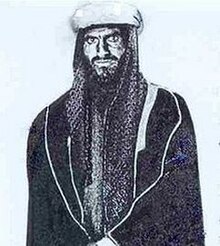Uprising of Ichwan
The uprising of the Ichwan , the fighting units of the Wahhabis on the Arabian Peninsula , lasted from 1927 to 1930. It began in 1927 when the Mutair and Ajman tribes rose up against the Saudi King Ibn Saud and raided the direction of Transjordan , Mandate Iraq and the Emirate of Kuwait undertook. This resulted in massacres of the civilian population, the destruction of the graves of saints and also regular looting .
At the beginning of the 20th century, the Arabian Peninsula was the scene of numerous tribal wars, which ended with the unification of the Saud dynasty. Mainly involved were the Ichwan , a Wahhabi - Bedouin army led by Sultan bin Badschad al-Otaibi and Faisal al-Dawish. After the collapse of the Ottoman Empire after the First World War , the Ichwan had conquered what is now Saudi Arabia by 1925 , starting from the Saudi heartland of Najd . In 1918 and 1919 the Ichwan fought successful battles for the Churma and Turaba oases . In 1924 the Ichwan captured Taif , where they massacred several hundred residents. This is what resulted in Mecca voluntarily Ikhwan , which then the shrines of Mecca and Medina ( Baqi cemetery destroyed). In their zeal for faith, the Ichwan also oppose the introduction of all technical innovations such as automobiles and telegraphs , which they strictly rejected as "forbidden innovations" ( bid'a ).
Ibn Saud, who could no longer curb the fanatical zeal for faith of the Ichwan , defeated them in 1929 at the Battle of Sibilla.
